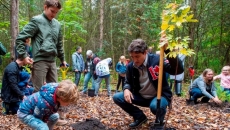OTTAWA - The head of the Canadian Labour Congress expressed worries on Tuesday that labour groups could be left out of talks over a federal pledge to let workers access skills training programs before they become unemployed.
Congress president Bea Bruske said her concern is some provinces won't consult unions on how to redirect the federal training cash to help workers before they land on employment insurance.
The Liberals are also proposing to update agreements on the over $2 billion the federal government sends annually to provinces for skills training programs.
The budget proposes directing cash toward tackling current and future labour market needs, including helping mid-career workers transitioning to new sectors.
Bruske said expanding the scope of the labour market development agreements, as they're known, is a positive step.
"But we are worried about whether or not it's going to be done in the right way," she said, arguing that provinces like Alberta and Ontario don't value consulting unions.
"If workers aren't at the table to address the issues that we need to address in terms of where the shortages are going to be and where there's going to be pain in terms of unemployment, then how do we make sure that workers are actually covered by the very issues that we're trying to address?"
The budget released last week also proposes changes to the Employment Insurance Act to provide direct support to employers to retrain workers, and make more workers eligible for help before they become unemployed.
The federal government annually sends money through the agreements to provinces and territories to provide services to unemployed people, many of whom are eligible through the EI system, find and hold a job.
A federal review of the agreements released in May 2021 suggested funding was helping train workers for in-demand jobs, but also highlighted a series of hurdles preventing many from taking part. Among the problems identified were a lack of essential skills or knowledge of programs, learning disabilities and living in remote communities.
Widespread labour shortages and a historically low unemployment rate has helped drive demands for a rethink of skills training and the EI program itself that is under review. Employment Minister Carla Qualtrough is expected to release a report on the future of EI in the fall.
"We haven't touched the EI program for 70 years. Optimistically and truly, this is our once-in-a-lifetime opportunity to crack this wide open," said Leah Nord, senior director of workforce strategies at the Canadian Chamber of Commerce.
Nord said EI should evolve toward a talent development process, one where help is provided to workers during a job loss to land a position in sectors with the greatest need. That help could come before someone loses a job, she said, or targeted to those out of the labour market the longest.
Statistics Canada's latest jobs report showed that in February there were 225,000 out-of-work Canadians whose ongoing job search had stretched for at least six months, which was 45,000, or almost 25 per cent, above pre-pandemic levels recorded in February 2020.
Michael Wilcox, an economist with the Labour Market Information Council, said filling available positions and boosting employment figures will require employers to tap into those long-term unemployed as well as other underutilized groups like older workers, immigrants and youth.
"Eliminating barriers to access and encouraging those who have left the labour force to rejoin is critical," he said. "Skills training and better labour market information are two supports that could help."
Deloitte Canada's post-budget analysis said the government should pay attention to those at risk of being excluded from labour market gains, including women, low-income households, Indigenous Peoples, and newcomers.
While the budget included $272.6 million over five years to help people with disabilities enter and stay in the labour force, Deloitte Canada's report released Tuesday suggested more may be needed to train Indigenous youth.
"Investing in overall labour force participation would increase Canada's average real GDP growth and lift the annual trend pace of economic growth," the report said.






